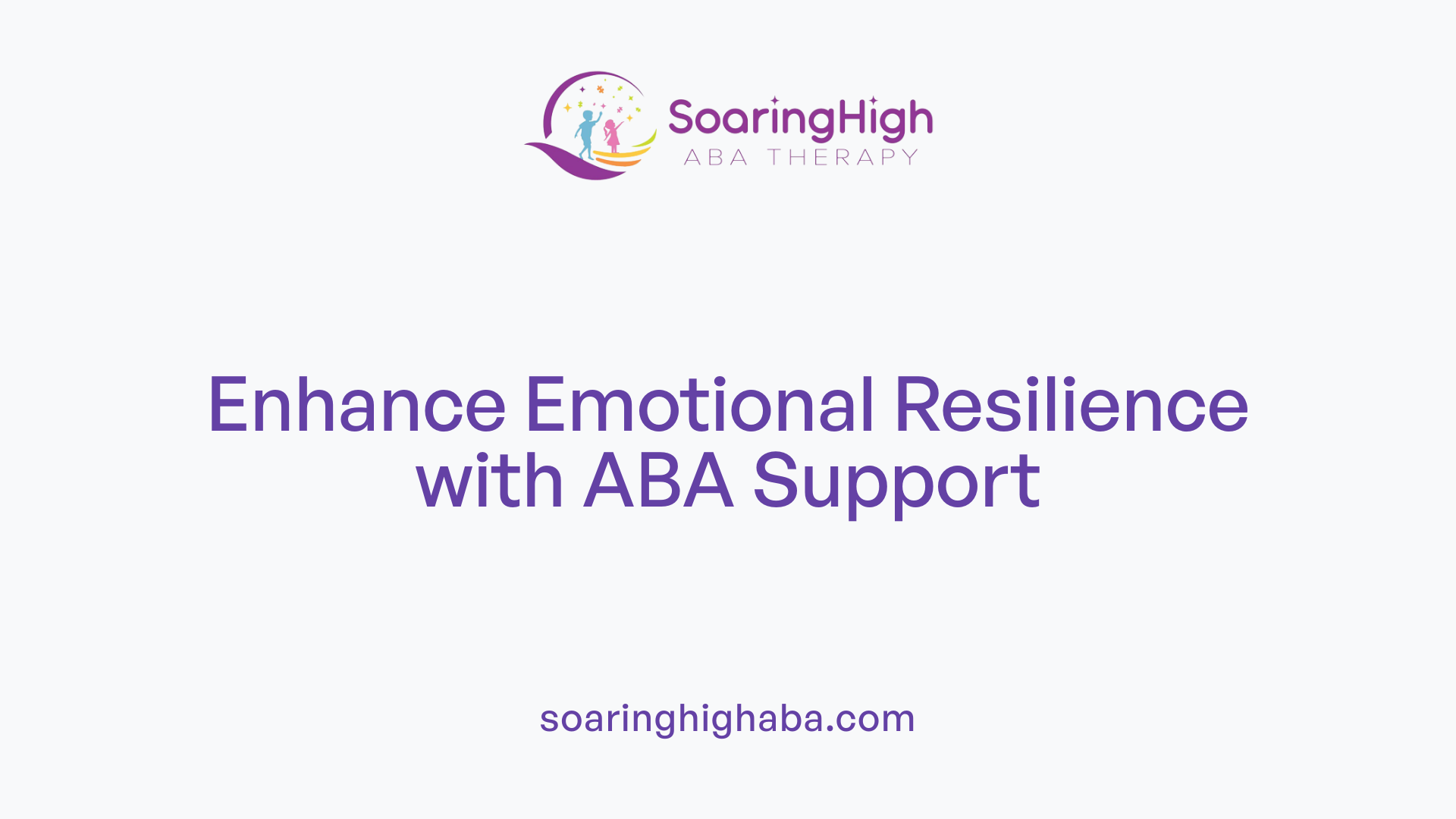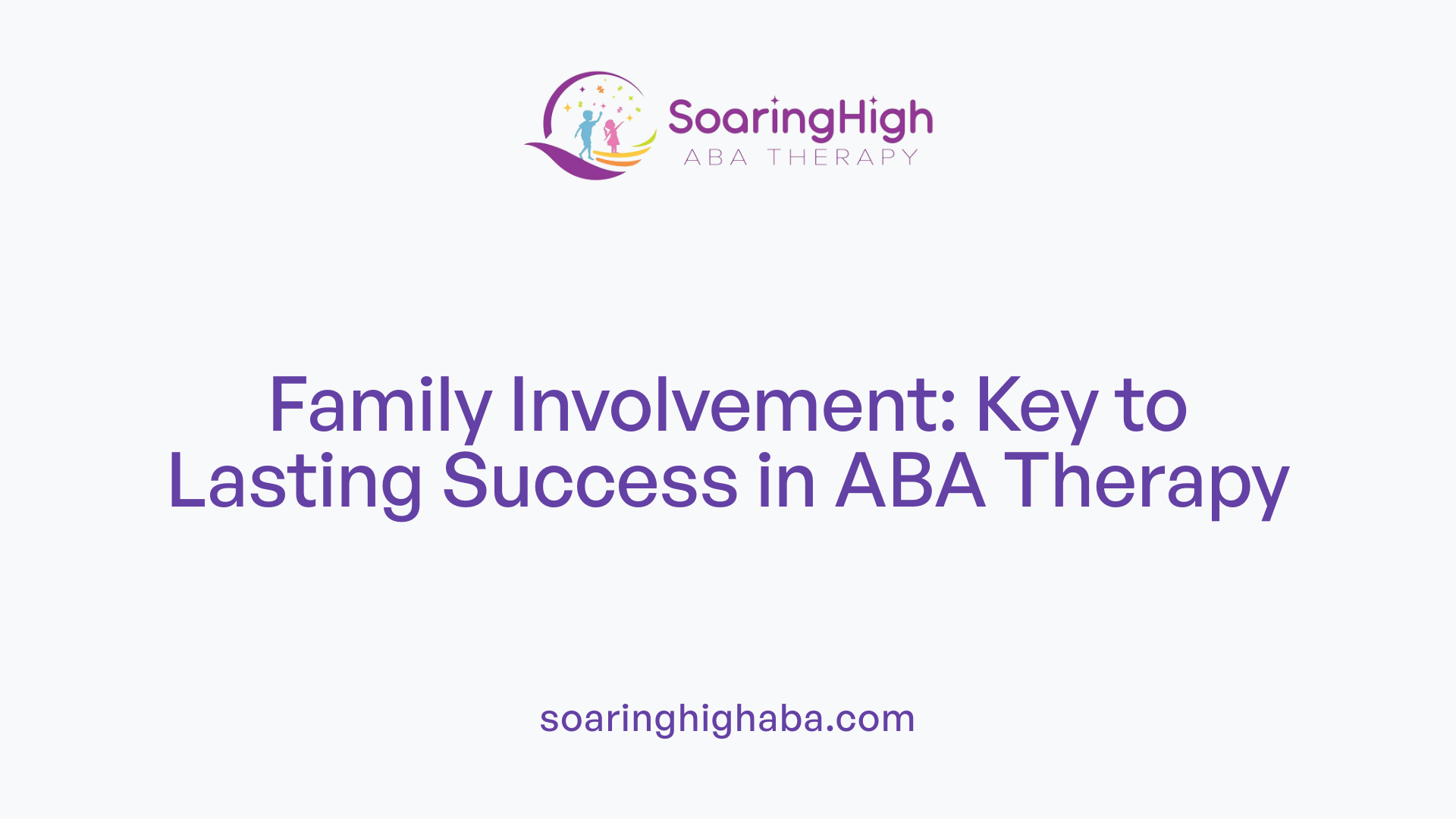Building Confidence in Every Step
ABA therapy stands as a scientifically validated approach that helps children with autism develop vital skills across social, academic, and daily life domains. By focusing on personalized interventions and positive reinforcement, ABA fosters confidence, independence, and emotional resilience. This article explores how ABA therapy nurtures self-esteem and competence in children, enabling them to navigate the complexities of school and social environments with increased assurance.
Enhancing Academic Confidence Through Skill Mastery

How does ABA therapy support children's confidence in academic settings?
ABA therapy plays a significant role in boosting children’s confidence at school by focusing on teaching vital skills like communication, social interaction, and daily self-care. These skills help children become more active and independent participants in classroom activities.
One of the main strategies used is breaking down complex academic tasks into smaller, manageable steps. This approach makes learning less overwhelming and allows children to experience consistent success as they master each component. Regular reinforcement for achieving specific goals encourages children to keep trying, building motivation and a positive attitude towards learning.
Creating a structured environment through routines and clear expectations reduces anxiety. When children know what to expect, they feel more secure, which facilitates better focus and engagement.
ABA therapy also emphasizes the development of social and emotional skills, such as understanding social cues and managing emotions. These abilities improve peer interactions and help children form friendships, making school a more inclusive and supportive setting.
By fostering both academic and social competence, ABA helps children see their own progress and capabilities, leading to increased self-esteem and independence. This sense of achievement motivates children to participate more fully, reinforcing their confidence in their educational journey.
| Skill Area | Teaching Methods | Outcomes | Additional Notes |
|---|---|---|---|
| Communication | Modeling, Reinforcement | Better expression of needs and feelings | Includes verbal and non-verbal skills |
| Academic Tasks | Breaking down into steps, Visual supports | Improved focus, problem-solving skills | Facilitates easier learning |
| Social Skills | Role-playing, peer practice | Enhanced peer relationships and group participation | Supports social confidence |
| Emotional Regulation | Self-talk, deep breathing | Reduced frustration, better behavior | Builds resilience |
ABA therapy’s personalized approach ensures each child’s unique strengths and needs are addressed. This tailored support helps children build a solid foundation of skills, essential for success both inside and outside the classroom. As they experience consistent growth and achievement, their confidence continues to grow, setting them up for ongoing success.
Fostering Social Confidence and Social Skills Development

How does ABA therapy improve social skills?
ABA therapy focuses heavily on developing social skills that are vital for successful peer interactions. Through targeted training, children learn how to make eye contact, share, take turns, and understand social cues.
What role do peer interactions play in ABA therapy?
Peer interaction exercises are integral in reinforcing social skills. Children practice engaging with others in safe, controlled environments, gradually gaining confidence to participate in group activities.
How does learning social cues benefit children?
Recognizing facial expressions, body language, and tone helps children understand others’ feelings and intentions. This understanding improves their ability to respond appropriately, fostering better relationships.
How are role-playing and modeling used in ABA to teach social skills?
Role-playing and modeling serve as practical techniques to teach social behaviors. Therapists demonstrate desired behaviors, which children observe and imitate in real-life scenarios, enabling them to apply skills like sharing, turn-taking, and conflict resolution.
| Technique | Purpose | Example of Use | Effect on children |
|---|---|---|---|
| Role-playing | Simulates real-life social situations | Practicing greeting a peer or asking to join a game | Builds confidence and social understanding |
| Modeling | Demonstrates appropriate behavior for children to imitate | Showing how to make eye contact while speaking | Encourages adoption of positive social norms |
| Natural Environment Teaching (NET) | Uses everyday settings for practice | Playing in the classroom or playground | Enhances generalization of skills across settings |
How does ABA therapy boost children's confidence?
ABA therapy nurtures confidence by making social learning engaging and rewarding. It involves positive reinforcement, which encourages children to practice skills repeatedly.
Children experience success as they master social behaviors through structured activities. As they recognize social cues and respond appropriately, their self-assurance grows.
Gradually, children learn to navigate social environments with less anxiety. They build resilience by describing their feelings, practicing assertiveness, and playing interactive games.
Overall, ABA therapy equips children with essential social tools, empowering them to participate actively and confidently in social settings.
| Aspect | Description | Benefit |
|---|---|---|
| Social Skills Training | Focused lessons on-making eye contact, sharing, turn-taking | Improved peer relationships and social confidence |
| Peer Interaction Practice | Engaging in supervised group activities | Increased social competence and reduced shyness |
| Recognizing Social Cues | Learning to interpret facial expressions and body language | Better understanding of others, enhancing interactions |
| Role-Playing and Modeling | Demonstrating behaviors through guided activities | Practical mastery of social behaviors |
ABA therapy's personalized approach ensures each child develops social skills at their own pace, leading to stronger peer relationships and greater social confidence.
Supporting Emotional Regulation and Behavioral Improvements

What are the benefits of ABA therapy in developing social skills and emotional regulation?
ABA therapy provides substantial support in nurturing social skills and emotional regulation, particularly for children with autism spectrum disorder. It uses scientifically proven methods that include positive reinforcement, ABC analysis (antecedent-behavior-consequence), and Pivotal Response Treatment to enhance communication and social understanding.
Through personalized goals and structured learning, ABA assists children in forming meaningful social connections and managing their emotions effectively. The therapy often involves practicing social behaviors in real-life scenarios such as making eye contact, taking turns, or sharing toys, which boosts social confidence.
In addition, ABA promotes self-regulation by teaching children strategies like deep breathing, self-talk, and recognizing emotional cues. These skills help children respond more calmly to frustrations and reduce problematic behaviors such as tantrums or aggression.
By reinforcing successful social interactions and emotional responses, ABA techniques foster emotional resilience. They also encourage generalization of these skills across different settings like home, school, and community, leading to more consistent behavior and improved emotional well-being.
Overall, ABA therapy significantly improves social competence and emotional resilience. Children become better equipped to establish relationships, handle stress, and participate actively in daily routines. These advancements contribute to greater independence and an improved quality of life.
The focus on individual needs and measurable progress ensures that each child gains the skills necessary to navigate complex social environments with confidence, making ABA a valuable intervention for fostering emotional and behavioral growth.
Building Daily Life Skills and Self-Esteem
How does ABA therapy contribute to building daily life skills and self-esteem in children?
ABA therapy plays a vital role in helping children gain independence in their daily routines. It teaches essential tasks such as personal hygiene, dressing, feeding, and toileting through structured programs that break these skills into manageable steps.
One common technique used is task analysis, which involves dividing complex activities into smaller, easier-to-learn components. Visual supports, like picture schedules or step-by-step charts, are then employed to help children understand and follow each step confidently.
Reinforcement is a core element of ABA. When children successfully complete routines, they receive positive feedback, which encourages repeat behaviors. As they master these tasks, their confidence grows.
Generalization of skills is another focus. Children practice routines across different settings—home, school, and community—ensuring they can perform tasks independently regardless of environment.
Developing autonomy not only reduces reliance on caregivers but also boosts self-esteem. When children see themselves capable of managing daily activities, they feel more confident and motivated.
Overall, ABA therapy combines formal teaching methods with consistent reinforcement and environmental cues to foster independence, emotional resilience, and a positive self-image in children.
Psychological Well-being and Behavior Support Impact
How does ABA therapy influence children's psychological health and behavior?
ABA therapy plays a significant role in enhancing the emotional and behavioral well-being of children, especially those with autism spectrum disorder. It is designed to develop vital social and communication skills, as well as everyday functional abilities.
Through structured approaches like positive reinforcement, children are encouraged to engage in behaviors that promote independence and confidence. This methodology helps diminish problematic behaviors such as tantrums or aggression by replacing them with positive responses tailored to each child's needs.
Initially, some children might experience stress or frustration as they adapt to new routines or skills. However, over time, ABA therapy supports the development of effective coping strategies and emotional resilience. Children learn to better regulate their emotions, handle transitions smoothly, and participate more actively in social settings.
The therapy also boosts self-esteem by celebrating accomplishments and gradually building mastery over complex tasks. Personalized interventions ensure that each child's unique strengths are nurtured while addressing specific challenges.
The overall impact extends beyond immediate behavioral improvements to fostering a sense of self-worth and emotional strength. When executed ethically and with high-quality implementation, ABA acts as a holistic mental health support, promoting well-being through behavioral and emotional growth.
What role do coping strategies, emotional resilience, and positive reinforcement play?
Coping strategies such as deep breathing or self-talk are integrated into ABA programs to help children manage stress and regulate emotions more effectively. This resilience enables children to face social and environmental challenges with confidence.
Positive reinforcement, a core technique used throughout ABA, rewards desirable behaviors, reinforcing the likelihood of their recurrence. It builds a positive self-image, encourages persistence, and motivates children to continue learning new skills.
Together, these approaches create a supportive environment where children gradually develop the tools necessary for long-term emotional stability and social success.
| Aspect | Description | Impact |
|---|---|---|
| Coping strategies | Techniques like deep breathing, role-playing, and self-talk | Reduce stress, improve emotional management |
| Emotional resilience | Ability to bounce back from setbacks and handle frustration | Increased confidence, better social interactions |
| Positive reinforcement | Rewards for achieving goals, promoting desirable behavior | Self-esteem boost, motivation to learn and improve |
Long-term, these strategies contribute profoundly to children’s overall mental health, helping them navigate life's complexities with increased independence and confidence.
Search insights
An exploration of the term "ABA psychological well-being" reveals widespread acknowledgment of ABA’s role in supporting mental health by addressing behavioral and emotional challenges. This approach is recognized for its effectiveness in fostering resilience, emotional regulation, and positive social engagement, making it a vital component of comprehensive developmental care.
Fostering Confidence with Structured Interventions and Routine
How does ABA therapy foster confidence in children with autism?
ABA therapy builds confidence in children by carefully combining structured strategies with personalized support systems. This evidence-based approach promotes skill mastery through clear goals and positive reinforcement, encouraging children to succeed and feel proud of their accomplishments. When children experience success in tasks like communication, self-care, or social interactions, their self-esteem naturally improves.
A significant aspect of ABA therapy is its emphasis on predictability and routine. Structured schedules and visual supports create a safe learning environment, helping children anticipate what comes next and reducing feelings of uncertainty. This consistency fosters a sense of security, allowing children to participate more fully and confidently in daily activities.
Breaking down complex skills into manageable steps allows children to achieve small victories regularly, which gradually boosts their belief in their abilities. Celebrating these successes reinforces the idea that effort leads to progress, cultivating a growth mindset. This mindset encourages children to view challenges as opportunities to learn rather than obstacles.
Furthermore, ABA therapies incorporate social stories, role-playing, and individualized interventions to develop social and emotional skills at each child's own pace. These strategies give children a sense of mastery and self-advocacy, essential components of confidence.
By focusing on strengths and interests, ABA allows children to engage in activities where they can excel. This approach not only boosts self-esteem but also encourages independence and resilience, setting the foundation for long-term success across various settings.
The Importance of Family and Caregiver Involvement

How does ABA therapy involve families to ensure long-term success?
Family involvement plays a crucial role in the effectiveness of ABA therapy. Therapists work closely with parents and caregivers to reinforce skills learned during sessions, ensuring consistency and supporting children in applying new behaviors in everyday life.
This collaborative approach helps children transfer skills from the structured therapy environment to home, school, and community settings. Educating families on techniques such as positive reinforcement, prompting, and modeling enables caregivers to actively participate in their child's development.
Reinforcement at home creates a stable learning environment and boosts children’s confidence by recognizing their efforts and successes. When families practice skills like communication, social interaction, and daily routines consistently, it substantially increases the likelihood of sustained progress.
Furthermore, involving families helps generalize skills across different environments. This is vital because children often need to demonstrate their abilities in various contexts to truly benefit from therapy.
Active engagement from family members fosters a supportive atmosphere, which enhances emotional resilience and motivation. It also allows for addressing individual challenges more effectively and customizing interventions as needed.
Overall, integrating family involvement with professional guidance bridges the gap between therapy and everyday life, helping children attain long-term developmental gains and greater independence.
Empowering Children for Lifelong Success
ABA therapy's structured, positive approach equips children with crucial skills, confidence, and resilience necessary for thriving in academic, social, and daily life environments. Through tailored interventions, family collaboration, and a focus on emotional well-being, ABA helps children recognize their strengths, overcome challenges, and develop independence. The long-term benefits—ranging from improved social interactions to academic achievements—highlight ABA's vital role in fostering lifelong confidence and success.
References
- Applied Behavior Analysis Builds Life Skills for Children
- How ABA Therapy Prepares Kids for Life Experiences
- ABA Therapy in Schools: Improving Social Skills and ...
- The Psychological Effects of ABA Therapy on Children
- How ABA Therapy Builds Confidence in Children with Autism
- 7 Surprising Benefits of ABA Therapy for Kids You Need to ...
- Applied Behavior Analysis Builds Life Skills for Children





































































































